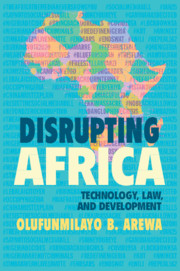Book contents
- Disrupting Africa
- Disrupting Africa
- Copyright page
- Dedication
- Contents
- Preface
- Acknowledgments
- Abbreviations and Acronyms
- Map
- 1 Introduction
- 2 Colonialism, Governance, and Law
- 3 Relationships and Accountability
- 4 Legal Imperialism and Institutions
- 5 Language, Authority, and Law
- 6 Technology Disruption and Digital Colonialism
- 7 Nigerian Princes, Start-Up Companies, and Potential Future Paths
- 8 Technology, Precarity, and Protest
- 9 Elites, Ornamentation, and Future Visions
- 10 Colonial Portfolios, Monopolies, and Competition
- 11 Conclusion
- Select Bibliography
- Index
4 - Legal Imperialism and Institutions
Published online by Cambridge University Press: 19 July 2021
- Disrupting Africa
- Disrupting Africa
- Copyright page
- Dedication
- Contents
- Preface
- Acknowledgments
- Abbreviations and Acronyms
- Map
- 1 Introduction
- 2 Colonialism, Governance, and Law
- 3 Relationships and Accountability
- 4 Legal Imperialism and Institutions
- 5 Language, Authority, and Law
- 6 Technology Disruption and Digital Colonialism
- 7 Nigerian Princes, Start-Up Companies, and Potential Future Paths
- 8 Technology, Precarity, and Protest
- 9 Elites, Ornamentation, and Future Visions
- 10 Colonial Portfolios, Monopolies, and Competition
- 11 Conclusion
- Select Bibliography
- Index
Summary
Chapter 4 analyzes the operation of colonial legal structures and looks at implications of parallel customary and English law frameworks put in place in contexts of legal imperialism in British colonies. This chapter also explores structures of government, separation of powers, and the construction of legislative, judicial, and executive branches during colonialism. The colonial executive power was largely unconstrained, which has contributed to structural problems in the organization and operation of postcolonial governmental structures that carried over from colonialism to a significant degree. The implications of these structures for postcolonial rule in Nigeria are also examined.
Keywords
- Type
- Chapter
- Information
- Disrupting AfricaTechnology, Law, and Development, pp. 93 - 139Publisher: Cambridge University PressPrint publication year: 2021

